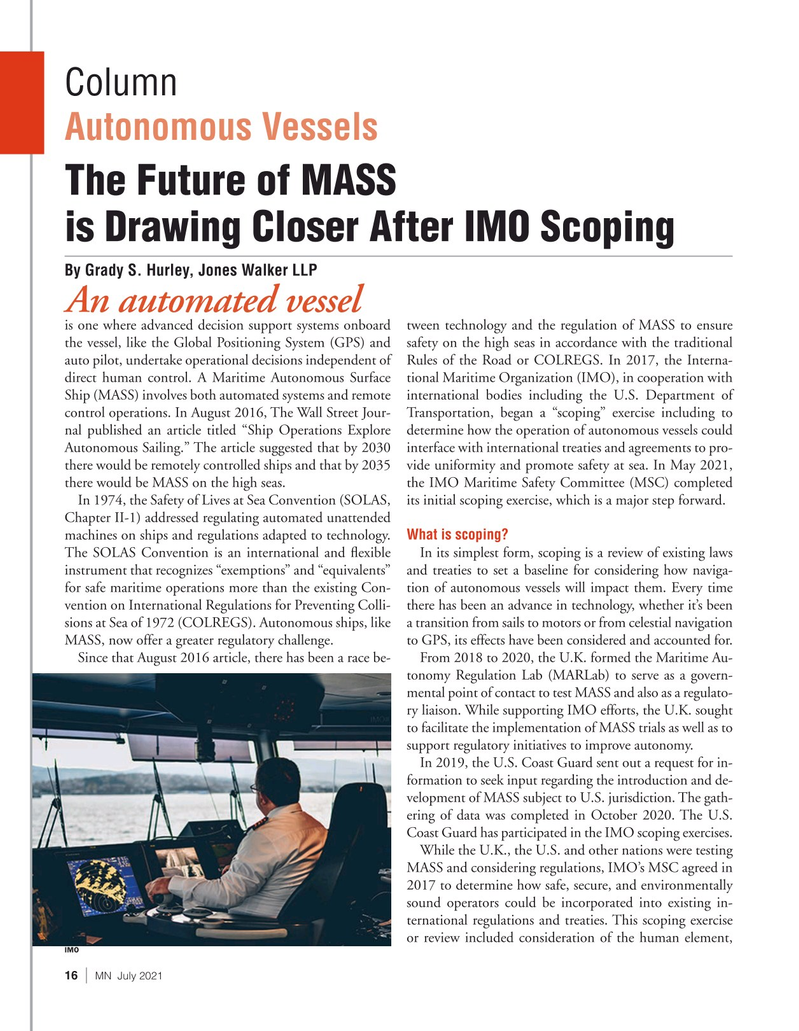
Page 16: of Marine News Magazine (July 2021)
Propulsion Technology
Read this page in Pdf, Flash or Html5 edition of July 2021 Marine News Magazine
Column
Autonomous Vessels
The Future of MASS is Drawing Closer After IMO Scoping
By Grady S. Hurley, Jones Walker LLP
An automated vessel is one where advanced decision support systems onboard tween technology and the regulation of MASS to ensure the vessel, like the Global Positioning System (GPS) and safety on the high seas in accordance with the traditional auto pilot, undertake operational decisions independent of Rules of the Road or COLREGS. In 2017, the Interna- direct human control. A Maritime Autonomous Surface tional Maritime Organization (IMO), in cooperation with
Ship (MASS) involves both automated systems and remote international bodies including the U.S. Department of control operations. In August 2016, The Wall Street Jour- Transportation, began a “scoping” exercise including to nal published an article titled “Ship Operations Explore determine how the operation of autonomous vessels could
Autonomous Sailing.” The article suggested that by 2030 interface with international treaties and agreements to pro- there would be remotely controlled ships and that by 2035 vide uniformity and promote safety at sea. In May 2021, there would be MASS on the high seas. the IMO Maritime Safety Committee (MSC) completed
In 1974, the Safety of Lives at Sea Convention (SOLAS, its initial scoping exercise, which is a major step forward.
Chapter II-1) addressed regulating automated unattended machines on ships and regulations adapted to technology. What is scoping?
The SOLAS Convention is an international and ? exible In its simplest form, scoping is a review of existing laws instrument that recognizes “exemptions” and “equivalents” and treaties to set a baseline for considering how naviga- for safe maritime operations more than the existing Con- tion of autonomous vessels will impact them. Every time vention on International Regulations for Preventing Colli- there has been an advance in technology, whether it’s been sions at Sea of 1972 (COLREGS). Autonomous ships, like a transition from sails to motors or from celestial navigation
MASS, now offer a greater regulatory challenge. to GPS, its effects have been considered and accounted for.
Since that August 2016 article, there has been a race be- From 2018 to 2020, the U.K. formed the Maritime Au- tonomy Regulation Lab (MARLab) to serve as a govern- mental point of contact to test MASS and also as a regulato- ry liaison. While supporting IMO efforts, the U.K. sought to facilitate the implementation of MASS trials as well as to support regulatory initiatives to improve autonomy.
In 2019, the U.S. Coast Guard sent out a request for in- formation to seek input regarding the introduction and de- velopment of MASS subject to U.S. jurisdiction. The gath- ering of data was completed in October 2020. The U.S.
Coast Guard has participated in the IMO scoping exercises.
While the U.K., the U.S. and other nations were testing
MASS and considering regulations, IMO’s MSC agreed in 2017 to determine how safe, secure, and environmentally sound operators could be incorporated into existing in- ternational regulations and treaties. This scoping exercise or review included consideration of the human element,
IMO 16 | MN July 2021

 15
15

 17
17
